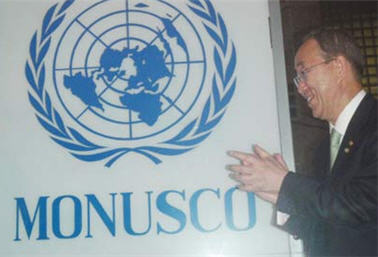
Reflecting the strides made by the Democratic Republic of the Congo (DRC) over the past decade, the United Nations peacekeeping mission entered a new chapter today, with Secretary-General Ban Ki-moon paying tribute to the commitment demonstrated by blue helmets in bringing peace to the region.
Last month, the Security Council passed a resolution authorizing the withdrawal of up to 2,000 UN military personnel – from an existing strength of 19,815 – by today from areas where security has improved enough to allow their removal.
From today, the UN mission will be known as the UN Organization Stabilization Mission in the DRC (MONUSCO) and will stay in the DRC only until 30 June next year.
“The emphasis is on stabilization and consolidating peace,” Mr. Ban said at the unveiling of a plaque during the introduction of the mission’s new phase in the capital, Kinshasa, yesterday.
He vowed that the UN will continue working with the DRC “to guide the progressive withdrawal of military peacekeepers in a way that does not jeopardize the gains the country has made.”
The Secretary-General emphasized the need to continue ensuring protection for civilians, especially women.
He also called on all parties, including Government forces, to put an end to sexual violence, which he called the “most serious denial of fundamental human rights.”
At the event, Mr. Ban recognized the dedication of peacekeepers who have served in the DRC, hailing the 157 men and women who have paid with their lives for the cause.
“Let us honour their memory by ensuring that together we can build the stability that the country needs to realize its great potential.”
Also in Kinshasa yesterday, the Secretary-General met with representatives of civil society, which he said is “critical to stability, to reconciliation in the wake of conflict, to a healthy democracy, and to human rights.”
He expressed his condolences on the death of prominent rights defender Floribert Chebeya, whose body was found on the outskirts of the capital last month after he was summoned to a police station.
So far, the chief of the national police has been suspended and several officers arrested in connection with the murder of Mr. Chebeya, who headed the non-governmental organization (NGO) known as Voix des Sans Voix (Voice of the Voiceless).
The slain defender’s work focused on human rights abuses in the DRC, including corruption in the military and the links between militias and foreign political forces.
“His courage was an inspiration for all who are dedicated to upholding human rights and defending public freedoms,” Mr. Ban said at yesterday’s meeting. “I hope his death will be investigated thoroughly, transparently and independently, with full respect for due process and the rule of law.”
The Secretary-General noted that the health of a country can be gauged by its “willingness and ability to carry out its human rights commitments,” stressing the importance of States to provide the conditions necessary to allow rights defenders and journalists to carry out their work, unhindered.
“The United Nations will stand by your side,” he told the civil society representatives. “Our priority is to see Africa achieve its potential.”
Related articles
- • DRC and Rwanda Sign Declaration of Principles for Peace in Eastern Congo (April 25, 2025)
- • UK Suspends Financial Aid to Rwanda Over M23 Rebellion (February 25, 2025)
- • Tshisekedi Announces Government of National Unity and Calls for Unity Against M23 Rebels (February 23, 2025)
- • UN Security Council Calls on Rwanda to Stop Supporting M23 Rebels in DR Congo (February 22, 2025)
- • Rwanda-Backed M23 Rebels Summarily Executed Children in Bukavu, UN Reports (February 19, 2025)
- • 'Deadly environment' plus 'political and social' obstacles hinder Ebola fight, Security Council hears (July 24, 2019)
- • Ebola outbreak declared an international Public Health Emergency (July 17, 2019)
- • Jean-Pierre Bemba Returns to DR Congo (August 1, 2018)
- • At least 30 dead after massacres in Ituri (March 2, 2018)
- • Botswana Urges Joseph Kabila to Step Down (February 26, 2018)
- • No elections in DR Congo in December without electronic voting machines: INEC (February 13, 2018)
- • DR Congo reach final of African Nations Championship (February 3, 2016)
- • Peacekeepers, Congo Army to Resume Joint Fight Against Rwandan Rebels (January 28, 2016)
- • Political tensions 'running high' in DR Congo ahead of 2016 elections (October 7, 2015)
- • UN Report Blames Ugandan Islamists for 237 Killings in DR Congo (May 14, 2015)
- • DRC Army Putting Pressure on FDLR (April 1, 2015)
- • Police Open Fire on Crowd Protesting Election Law Change (January 19, 2015)
- • Southern African Leaders to Meet in Zimbabwe (August 15, 2014)
- • Senior UN officials urge Brazzaville to halt expulsion of DR Congo nationals (May 26, 2014)
- • 15 dead in football match stampede in Kinshasa (May 12, 2014)
- • Security Council extends UN mission, intervention force in DR Congo for one year (March 28, 2014)
- • Death toll in Lake Albert boat accident rises to 251 (March 27, 2014)
- • Death toll in Lake Albert boat accident rises to 108 people (March 24, 2014)
- • New DR Congo amnesty law welcomed by UN envoys (February 5, 2014)
- • DR Congo, M23 Rebels Sign Declarations Marking End of Kampala Peace Talks (December 12, 2013)
- • Kabila Congratulates Congo Army for Defeating M23 Rebels (October 30, 2013)
- • Advancing Congo Troops Take Control of Rumangabo From M23 Rebels (October 28, 2013)
- • Congo Army Liberates Rutshuru, Kiwanja and Kibumba From M23 Rebels (October 27, 2013)
- • Rwandan Support for M23 Rebels Frustrates Attempts to End Fighting in Eastern Congo (September 26, 2013)
- • Ban Ki-moon Confirms M23 Rebels Shelled Rwanda (August 31, 2013)







